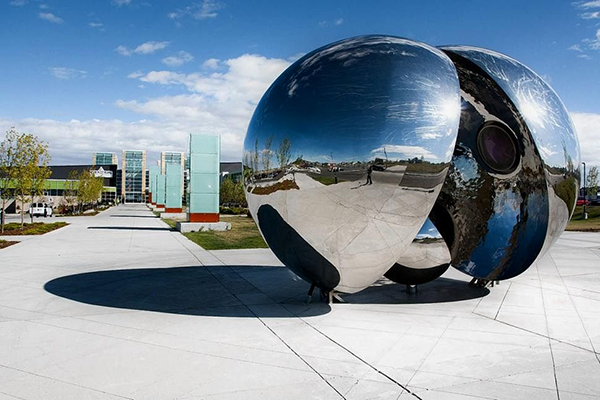Love it or hate it, public art gets people talking. A Canadian project called Wishing Well has revved up the debate once again.
Commissioned by the city of Calgary in 2012, Wishing Well is a stainless steel sculpture five metres tall and split at the apex into two hemispheres. Visitors stand between the two hemispheres and text a message to the ball inside. Microprocessors re-interpret the text into sound and light.

Wishing Well Sculpture (Image via NY Daily News)
It’s designed and built by Living Lenses, a Californian company comprised of Louise Bertelsen and Po Shu Wang who like to build interactivity into the pieces they create. Hence the cleft between the hemispheres. The trouble is, the sun’s reflection almost burned a hole in a visitor’s jacket while inside the cleft and although she wasn’t hurt, her complaint prompted the city to erect a fence around the piece to keep people away. Interactivity of the dangerous kind, the city reckoned.

Wishing Well Sculpture (Image via City of Calgary)
The installation cost CAD $ 559,000, part of Calgary’s commitment of allocating one percent of its infrastructure budget on public art. The city finally removed Wishing Well from a community centre last week.
Wishing Well is reminiscent of another reflective sculpture, Cloud Gate or as it’s more commonly called, The Bean, a Chicago landmark. It too went through a difficult birth. Designed by East Indian artist Anish Kapoor in 2004, the sculpture was plagued by construction delays – it’s made up of 168 stainless steel plates; the welds meticulously sanded to create a seamless surface – and cost overruns. The original budget of six million dollars ballooned to 23 million. Here too, there was a concern over public safety. Reflected heat in the summer, cold in the winter.

Bean Sculpture

The Bean gives visitors a unique and personal reflection of the immediate surroundings. There are times when it’s hard to tell where the sculpture ends and the sky begins. Like Wishing Well, visitors can get up close and personal by walking into the sculpture, or more specifically, underneath its centre point.

Despite the delays, The Bean was unveiled in 2006 and has since become a popular and iconic destination with tourists and locals.

Meanwhile, back in Calgary, removing Wishing Well has unleashed a war of words, underscoring an issue that divides its citizens. “Without art we have no soul,” says one online Calgarian. “Stop buying this crap and use the money to pay off public debt,” says another.
Wishing Well has been returned to the artists who are trying to correct the reflection problem. The Bean continues to enthrall and enchant.
Bean Sculpture Images © John Thomson



